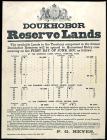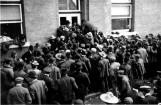14
More trouble awaited Verigin and his followers as the territories were merged into the province of Saskatchewan. A major shift also occurred in federal policy under Frank Oliver who became Minister of the Interior in 1905. The previous leniency of Clifford Sifton was forgotten and Oliver, who was openly hostile to both communalism and all Slavic sects, was determined to make the Doukhobors conform to the new government's regulations.All Doukhobors were now required to register individually for their homesteads and to fulfill all conditions. While most were now reluctantly willing to accept the part of the individual land registration condition, because of their religious beliefs (and of Verigin's past insistence never to swear an oath), they refused to the swearing of an oath of allegiance which was the final step to acquire title. In their opinion, swearing an oath was bad in enough - but to swear an oath of allegiance to the monarchy (which in their minds left them open for conscription), was simply unacceptable. They argued that the swearing of oaths was never part of the original agreement made in 1898, but their arguments fell on deaf ears. The non-negotiable ultimatum the government imposed was "sign the oath, or lose the land".
15
On some issues it seemed that Verigin's opinion was iron-clad. By Doukhobor tradition, people were allowed to speak in a sobranie (meeting) and the leader would then voice his or her opinion, much of the time making a decision final. It is reported that on this issue though, Verigin gave the 7500+ Doukhobors a choice to either stay in Saskatchewan and sign the oath (thus abandon their Doukhobor belief and Doukhobor faith) or follow him to a new land, a warmer climate, in the Interior of British Columbia.16
This new land, if purchased privately, would not entail the same 'strings' attached to the land the Dominion offered them, and under the assurance of the Province of BC that they wouldn't interfere with the community if they owned their own lands, Verigin encouraged the BC choice.18
In June 1907, over 256,800 acres - most which were choice, cleared and cultivated, hard-worked lands, were confiscated by the Dominion of Canada. This led to a mass 'land rush' whereby these prosperous lands were now simply given away to the public. (See the next screen's poster of 1907).Massive line-ups ensued as result of the land grab and opportunists gathered to take advantage of the pacifist Doukhobors' loss. Some of these opportunists were even other Doukhobors who chose not to follow their brethren and who had conceded to both the land registration and oath of allegiance.
19
Dominion Government poster, giving away confiscated Sakatchewan lands1 June 1907
Saskatchewan, Canada

20
Perhaps they saw value and an opportunity in an individual lifestyle as opposed to a communal lifestyle; perhaps they had just gotten tired of continually fighting the government(s). These Doukhobors who chose to remain in Saskatchewan would eventually total about one third of the Doukhobor population in Canada and would become known as 'Independent' Doukhobors.Those who would leave for BC would become known as 'Community Doukhobors' (later referred to as 'Orthodox Doukhobors'). Although he acknowledged these 'Independents' as brothers, Verigin was disappointed that some would abandon their faith and his suggestions and he had a few times reflected that the remaining Independent Doukhobors were traitors to Doukhobor beliefs - but this would not impede Verigin's plans.
